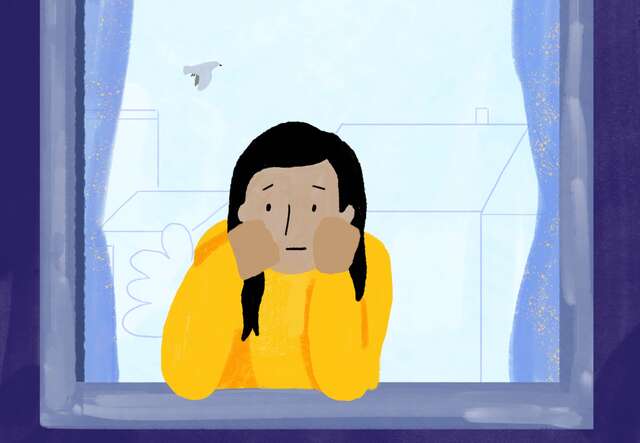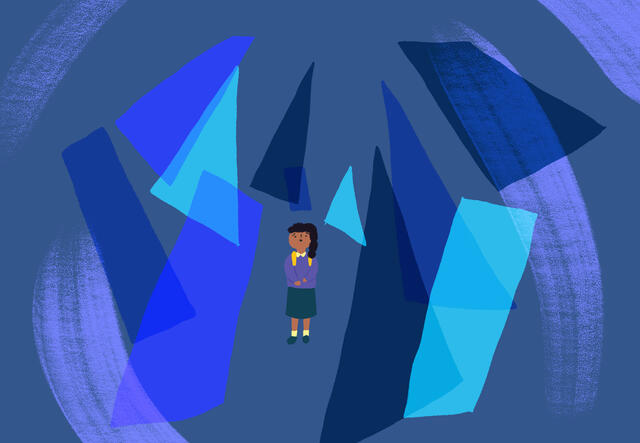
How to talk to kids about trauma
The International Rescue Committee’s Healing Classrooms programme provides training and resources to teachers and support staff of refugee students

The International Rescue Committee’s Healing Classrooms programme provides training and resources to teachers and support staff of refugee students
For children who witness conflict or crisis from a young age, it can have a lasting impact on their ability to thrive in educational and social settings.
Research has shown that children who experience trauma, can have a “toxic stress” response which affects their physical and mental wellbeing, as well as their relationships.
The International Rescue Committee’s Healing Classrooms programme provides training and resources to teachers and support staff of refugee students, which includes supporting them through trauma relating to war and conflict.

Suzanne Fisher, who is based in Brighton and Hove, working as a specialist English as an Additional Language (EAL) teacher for The Ethnic Minority Achievement Service (EMAS) has completed the IRC’s Healing Classrooms training and works across different schools with children with refugee status from Syria, Afghanistan, and Ukraine.
She told us that helping children to heal through trauma is based on having open and compassionate conversations. Here is some guidance on talking to children about trauma:
It’s important to let children decide if and when they want to open up and not pressure them to speak about their experiences.
Suzanne tells us while she always pays attention to concerning behaviours, she focuses on asking open-ended questions without any expectations.
“Allow them to talk as and when they want and need,” Suzanne said, continuing: “If they do, listen and empathise without trying to make it better or go away.”
Suzanne added that caregivers can often find it difficult when children express their trauma in different and challenging ways.
It’s about understanding that children need to express themselves. Speaking with them, in an age-appropriate way, will help them find words to make sense of what has happened.
Before sharing, children need to feel safe, with Suzanne stressing the importance of building strong bonds.
This could mean making quality time to take part in activities you both enjoy, as well as sensitively getting to know triggers that may cause distress.
Speaking of her work as a specialist EAL teacher across different schools, Suzanne said: “If possible, I meet with the parents as early as possible, to build a relationship of trust. The new school setting for them is a key part in their arrival and secure settling.” There are resources on the Healing Classrooms webpage that provide advice and support on how to best welcome newly arrived students.
Suzanne also advises the class teacher does their best to make children feel ‘welcomed and wanted’ in class by creating pegs, drawers and books with their names so that they feel immediately part of something.
She adds that non-verbal communication and support such as ‘lots of smiles’ is also key to making a child feel more comfortable.

Creative outlets like drawing or journaling can also help young people to process internally. Suzanne uses art which she says is enjoyable and relaxing, while also facilitating conversations around traumatic experiences.
Art based activities based on themselves have opened up conversations and let children speak at their own pace. Also, creating collages about their family members or friends. Ukrainian children often make images of their fathers who they are missing and this gives them a chance to talk about them. Others have done the friends who have supported them when they first arrived and talking through how those friends helped has been good to share with the class.
Gentle activities and images can also be ‘soothing to the nervous system’, Suzanne said, adding: “It can down regulate the fight, flight or freeze, allowing them to relax and trust their surroundings.”
Strategies like deep breathing, exercise and relaxing games can help regulate emotions and build resilience over time.
Suzanne’s colleague Reshma Meah - who is also an EMAS specialist EAL teacher - said informal mindfulness activities can also be a good way to help a child relax in their surroundings.
“We often work in a quiet space and engage in focused activities,” she said.
“We play games that help us to observe feelings. We use different mediums in our artwork and use our senses to explore colour and texture. At the end of the session, we do some positive reflection on our work.
“These are some of the activities we do. They require our attention and focus and can contribute to mindfulness in an informal way.”
Suzanne said it is important to seek outside help when a child has trauma that is affecting their day-to-day relationships and feelings of self-worth.
Opening up about her own experience, she said it’s time to reach out ‘when strategies which enable a child to begin to heal are not making significant and lasting improvements.’
Supporting children can also take an emotional toll, with Suzanne explaining that while she always ensures she is totally present at school, she has to allow herself to switch off when she is not.

“I need to keep boundaries around what information I take in,” Suzanne said.
“I know that I have to limit the amount of news I hear or see as it affects me, overwhelms me and puts me at risk of not being able to support the children who do need me.”
Learn more about the IRC's Healing Classrooms programme and the courses we provide here.
The International Rescue Committee responds to the world's worst humanitarian crises. We help to restore health, safety, education, economic wellbeing and power to people devastated by conflict and disaster. And we are proud to fight for a world where women and girls have an equal chance to succeed.
Read more about the International Rescue Committee in the UK